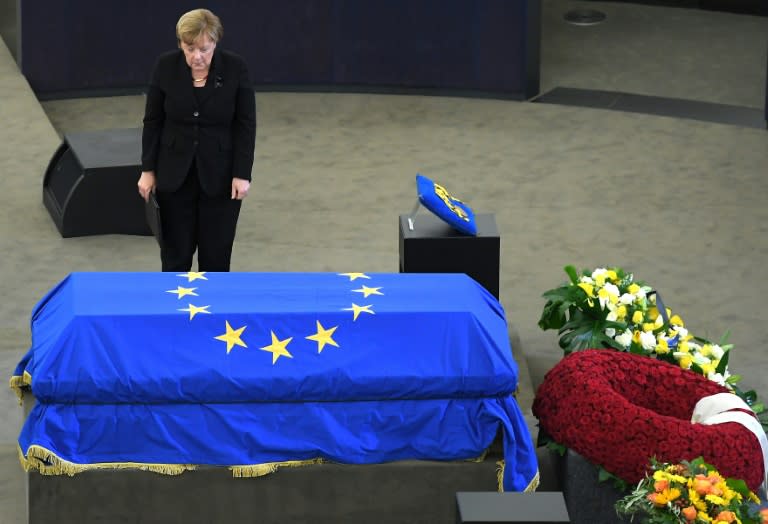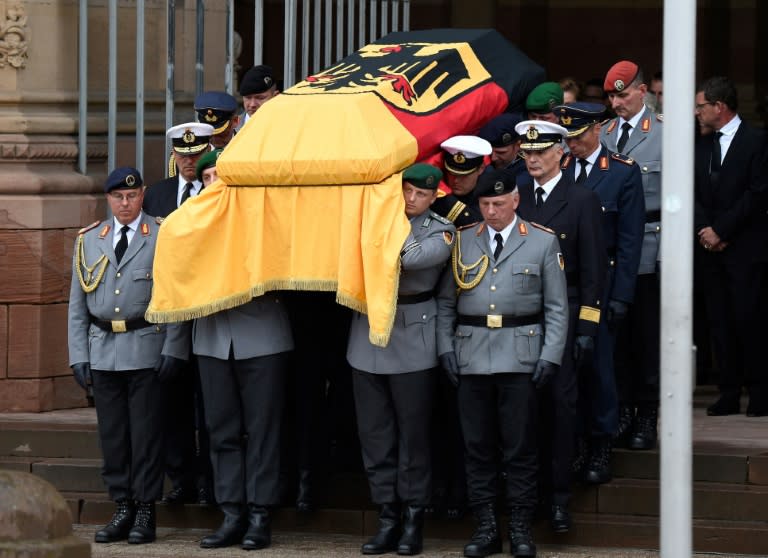Europe pays tribute to Helmut Kohl, 'a giant' of post-war history
European leaders joined former US president Bill Clinton on Saturday to pay a unique tribute to former German chancellor Helmut Kohl, who oversaw the German reunification and the end of the Cold War, but a family row marred his funeral. Kohl was a founder of modern-day Europe and served as chancellor from 1982 to 1998. He died on June 16 aged 87. "A giant of the post-war period has left us," European Commission chief Jean-Claude Juncker said in an oration in the French city of Strasbourg, where the European Parliament is located. It was the first time that the European Parliament has paid tribute to a leader in such a manner. "Helmut Kohl was not just the architect of German unity. He contributed substantially, more than others, to the reconciliation between European history and European geography," adding that without Kohl "Europe would not have the euro." On Kohl's watch, the pro-Western and pro-Soviet states of West and East Germany reunified after the fall of the Berlin Wall in 1989, becoming one of the stablest and most prosperous democracies in the world. With former French president Francois Mitterrand, Kohl also drove the expansion and integration of the EU. Together, they helped to open up its membership to fledgling democracies of the former Soviet bloc, create the euro single currency and ripped away internal border controls. "Helmut Kohl gave us the chance to be involved in something bigger than ourselves, bigger than our terms in office and bigger than our fleeting careers," Clinton said. - Merkel moved - Kohl's successor and one-time protege, Angela Merkel, struggled to rein in her emotions as she hailed "the chancellor of unification." "Without Helmut Kohl, the life of millions of people, mine included, who lived on the other side of the wall, would not be what it is today," she declared. French President Emmanuel Macron said: "Helmut Kohl was a privileged partner for France, an essential ally, but he was also more than that, he was a friend," "We are here to salute his mark on history." The EU flag of 12 gold stars on a blue background was draped over the coffin, which was placed in the chamber of the European Parliament by a phalanx of eight German soldiers. Three wreaths were placed in front of the casket -- one in the colours of the Federal Republic of Germany, the other in the name of the EU, and the third in the name of Kohl's wife Maike Kohl-Richter, bearing a simple inscription: "In Liebe, deine Meike" (With love, Maike). The choice of Strasbourg for the ceremony carried great symbolic weight. A city on the Rhine border with Germany, Strasbourg is located in a region that once was bloodily contested by France and Germany. Its location is an emblem of the post-war reconciliation between the two former enemies that was fostered by the EU. The parliament building was ringed by steel for the ceremony, with more than 2,000 police on duty. Kohl's coffin was then taken by boat down the Rhine to the southwest German town of Speyer for his funeral service. It was draped in the black, red and gold flag of Germany, with the eagle of the federal republic at its centre. - Family row - Kohl's funeral started at around 1600 GMT in the cathedral of Speyer. About 1,500 people attended the mass, which was followed by a military tribute. The funeral was watched by some 600 people as it aired on a giant television screen outside the cathedral, police said. But his sons and their families boycotted the event. Kohl's elder son Walter had criticised his second wife Maike, who is 34 years younger than Kohl, for spurning the offer of a state funeral in Germany. One of the reasons for her refusal was lingering anger at Merkel for her treatment of her former mentor. Merkel ousted Kohl from the leadership of the Christian Democratic Union (CDU) and urged the party to drop him when he became embroiled in a party funding scandal. Walter Kohl had wanted his father's coffin to be taken to the German capital for "a national homage, an ecumenical requiem and a military farewell ceremony" near the Brandenburg Gate, where the German leader witnessed the fall of the Berlin Wall. Because of a long-running feud with his stepmother, who jealously guards her husband's political legacy, Walter Kohl had not had contact with his father for many years and said he learned of his death from a radio report. burs/ach/su




